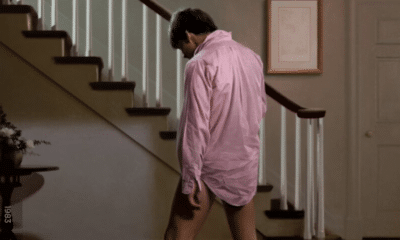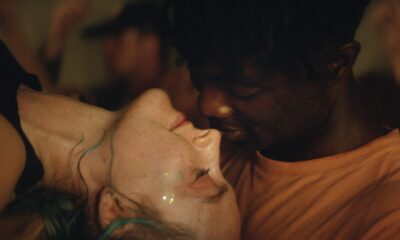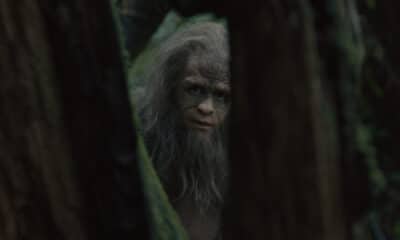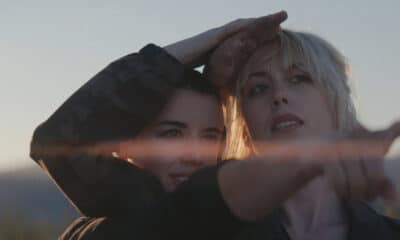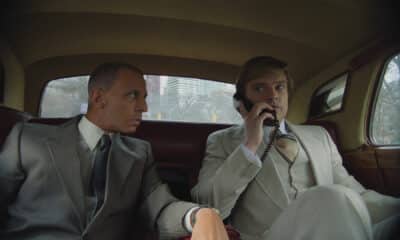Although Arrow Video FrightFest has claimed the lion-share of horror offerings that are being presented at this year’s Glasgow Film Festival, it doesn’t have a monopoly on them. Zalava is one that has escaped their net, having just debuted as part of the ‘normal’ programming. Set in rural Iranian Kurdistan during the year 1978, Zalava pits serious and sensibly minded military man Massoud (Navid Pourfaraj) against the old-world superstitions of the residents of the isolated town of Zalava, with dire consequences.

In the middle of the divide between Massoud and the Zalava towns people sits Armadan (Pouria Rahimi Sam), a local exorcist. Armadan has been working tirelessly with the people of Zalava to keep on top of their demon problem. Because he has saved so many of their number, the townsfolk love and worship Armadan and are bereft at the idea of Massoud, who believes Armadan to be nothing more than a con artist and swindler, and arrests him. Armadan is quite charismatic however, and as Massoud’s journey progresses, he finds himself questioning what he believes in.
Despite being billed as having ‘horror elements’, there is little in the way of traditional horror beats here, although a nocturnal encounter with a rabbit in a bag is sure to scare some. Where the horror aspects appear is within the themes and issues explored. Zalava is under constant threat of demons. It has a history of people being possessed and only Araman has been able to save those that have been afflicted. The control he wields is a dangerous one and it is from their blind devotion that some unease seeps in. Araman is so convincing that, much like Massoud, the viewer finds themselves questioning the validity of his words. An empty (or is it?) jar takes on a menacing dimension; the question of whether a demon resides inside or not creates some great tension for both those on screen and those watching from the discomfort of their seat.
This is a complex study and analysis of faith and of the power it has to bend people to its will. Zalava’s themes bubble away, slowly simmering in the background before they boil over during the final act. It is here that lines are drawn in the sand. As superstitions collide with paranoia and fear mongering, the air becomes electrically charged; unexpected outbursts lead to a dramatic and devastating finale. Zalava does take its time to arrive at this final showdown, but nothing in the set-up has been overlooked. Every look, interaction, and word uttered has a part to play in laying the foundation for what will come later, though this only becomes clear when looking back through the eye of the storm.
As cleverly constructed as the narrative is, where Zalava excels is with the visuals that it presents. Told across both day and night, Zalava begins under the harsh hot sun. The daytime settings are overly sunny and beautifully captured, highlighting the environment and the dangers that it hides. Zalava is a village removed from others, set within perilous hills and only accessible via some precarious winding roads. Massoud’s journey to visit the townsfolk will be enough to keep some on edge, the camera not shying away from the steep drops into oblivion that are mere inches away from the tyres on the road. All these shots begin to paint a picture of the hostility and old-world feel of the land upon which Zalava rests, its threats to life offering a foreshadowing of the trauma to follow. Once Massoud has Aramadan in custody, the film moves from day into night. The prison setting is filled with the deepest of blacks with little to light them. It is during this section of the story that several higher energy set-pieces unfold, the low levels of light causing confusion, masking the truth of what is happening, once again forcing both Massoud and viewer to potentially reassess their own beliefs and values.
Zalava negotiates itself across several genres as it explores some age-old belief systems. It keeps the viewer as in the dark as its protagonist Massoud. His fact-based morals and disbelief in the otherworld have some wonderful parallels to some of the great characters in horror history. The first that springs to mind being The Wicker Man;s Sergeant Howie, and in many ways Zalava could be viewed as a Middle-Eastern take on folklore. Beautifully shot and cleverly constructed, Zalava has all the components to get under your skin despite its less than traditional horror trappings.
Zalava
Kat Hughes
Summary
Even without the usual horror trappings, Zalava manages to be plenty creepy with its exploration of the dangers that blind faith can manifest.
Zalava was reviewed at the Glasgow Film Festival 2022.
Kat Hughes is a UK born film critic and interviewer who has a passion for horror films. An editor for THN, Kat is also a Rotten Tomatoes Approved Critic. She has bylines with Ghouls Magazine, Arrow Video, Film Stories, Certified Forgotten and FILMHOUNDS and has had essays published in home entertainment releases by Vinegar Syndrome and Second Sight. When not writing about horror, Kat hosts micro podcast Movies with Mummy along with her five-year-old daughter.

Latest Posts
-


Home Entertainment
/ 7 hours ago‘Risky Business’ and ‘Blow Out’ are getting the UK Criterion treatment
Risky Business and Blow Out will be released on UK Criterion 4K Blu-ray this...
By Paul Heath -


Film News
/ 7 hours agoRelease date announced for ‘The Outrun’ with Saoirse Ronan
After premiering at this year’s Sundance and the Berlinale in Germany, the UK release...
By Paul Heath -


Apple TV
/ 1 day agoTrailer: André Holland leads Apple’s new limited series, ‘The Big Cigar’
Apple TV+ has released the full trailer for The Big Cigar, a new, six-episode...
By Paul Heath -


Film News
/ 1 day agoUK trailer, poster and release date for Sundance smash ‘Sasquatch Sunset’
Premiering in the UK at the Sundance London event in June is the brilliant...
By Paul Heath
